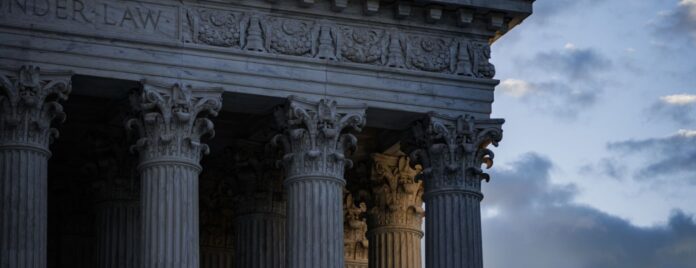The US Supreme Court deliberated on how to allocate a limited budget for tribal healthcare in a disagreement over whether tribes have the right to seek reimbursement for certain administrative costs from the government.
During the hearing on Monday, Justice Amy Coney Barrett remarked, “This is a complex statute,” referring to the Indian Self-Determination and Education Assistance Act at the heart of the case.
The law aims to empower tribes to manage their own healthcare programs using funds that would otherwise be allocated to the Indian Health Service for providing similar services.
Some justices raised concerns that providing more funding to tribes with self-run healthcare systems could disadvantage those dependent on government healthcare. Justice Brett Kavanaugh pointed out, “It necessarily will mean less funding for other tribes.”
On the other hand, some worried that curtailing the funds available under the statute, as suggested by the government, would contradict the law’s purpose. Chief Justice John Roberts noted, “A tribe is worse off the more they undertake in the direction of self-determination.”
Luxury Spa
Justices from both ends of the ideological spectrum seemed to struggle with interpreting the statute. Barrett raised a question about its practical implications, while Justice Ketanji Brown Jackson admitted, “I just don’t know, as a matter of just interest here, how these contracts work.”
The case revolves around overhead costs for tribes that are not experienced by the federal health service. Federal law mandates the IHS to cover certain expenses to ensure tribes can deliver a comparable level of care.
The justices are deliberating on which costs should be covered, particularly those related to payments from third-party insurers like Medicare, Medicaid, and private companies.
The government, represented by Justice Department attorney Caroline Flynn, expressed concerns about the costs escalating, making it challenging to cater to other tribes’ needs.
Flynn estimated that the annual cost could range from $800 million to $2 billion for the US, although she highlighted the uncertainty of the actual figure.
Both parties concurred that the funds are insufficient. Adam Unikowsky from Jenner & Block, arguing for one of the tribes suing for additional costs, stated that tribal healthcare is “chronically underserved” due to the limited budget available.
Roberts inquired whether the funds could be utilized to serve non-tribal members, as tribes have the authority to extend their healthcare services to such individuals. However, he noted that doing so would undermine the statute’s purpose.
Justice Neil Gorsuch remarked that tribes are unlikely to expand services beyond tribal members due to budget constraints. He emphasized, “There’s not so much money here that the tribes are spending this on frolics and detours, right?”
Sotomayor added, “It’s not as if all of this money is bringing us a luxury healthcare spa,” highlighting that the amount spent on tribal healthcare is minimal compared to the average American. She stressed that it only provides basic healthcare for tribal members.
The cases being discussed are Becerra v. San Carlos Apache Tribe, U.S., No. 23-250, argued on 3/25/24, and Becerra v. Northern Arapaho Tribe, U.S., No. 23-253, also argued on 3/25/24.
